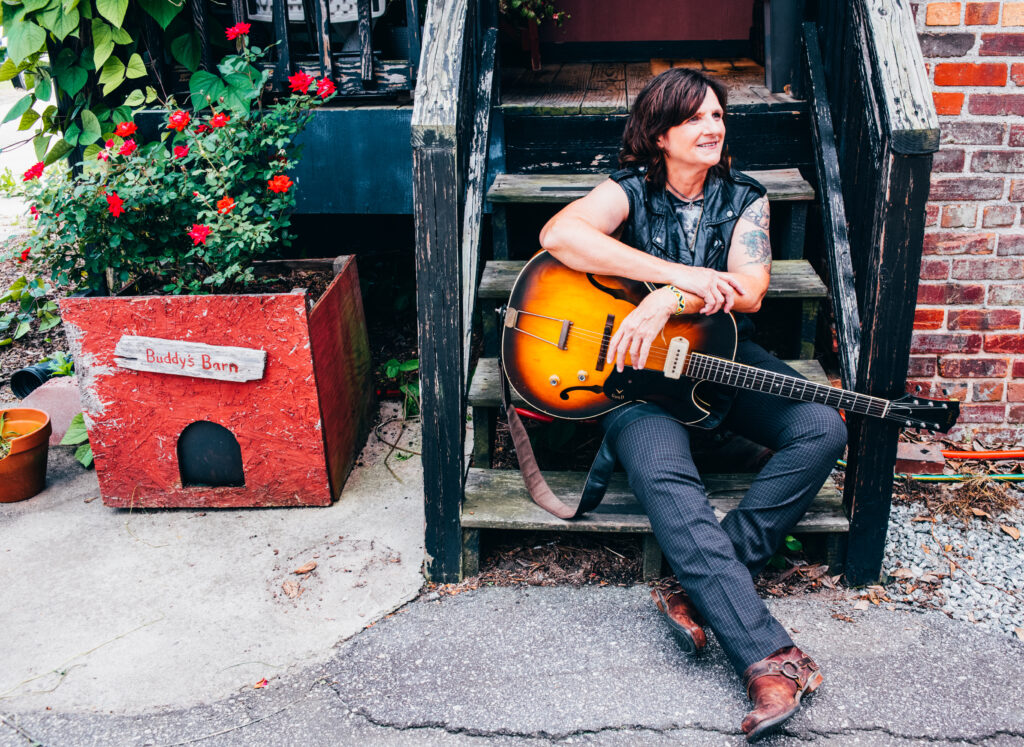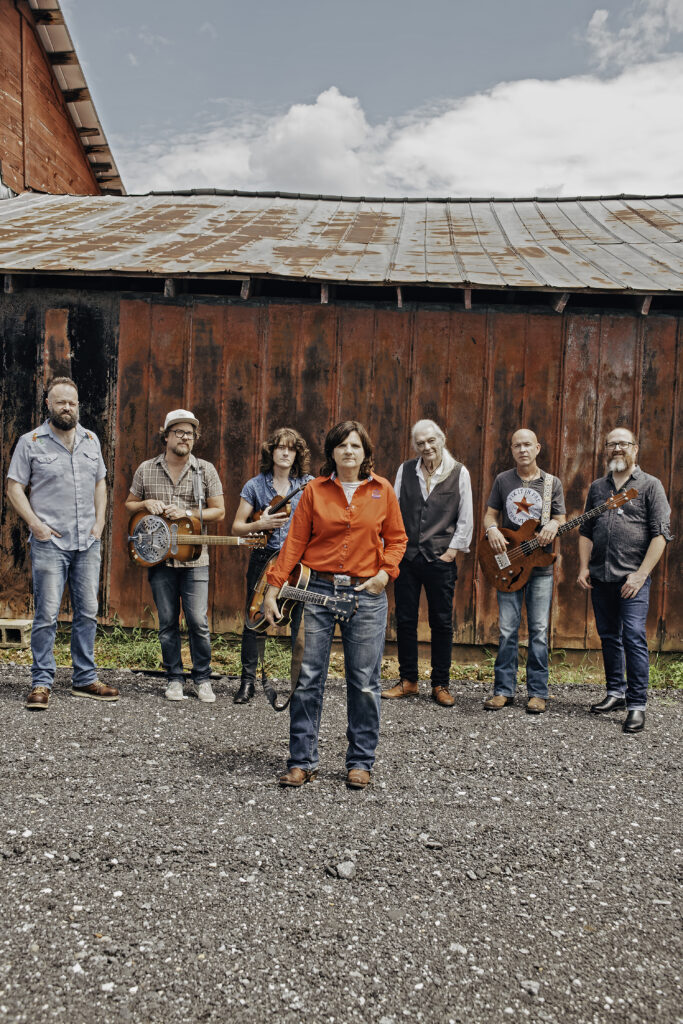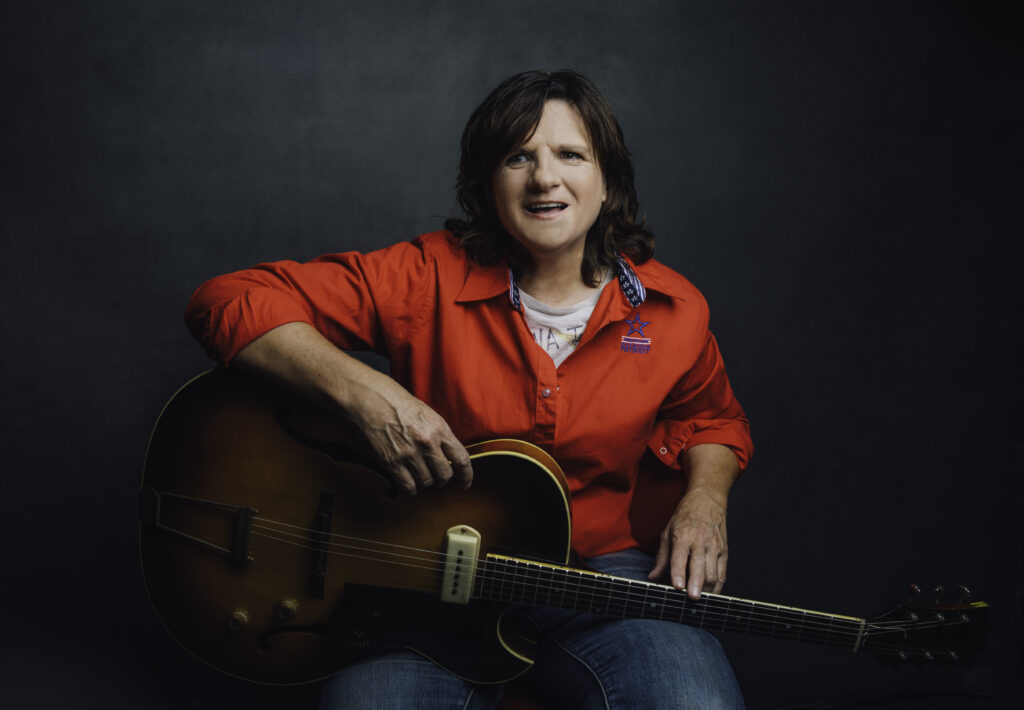Amy Ray teaches us a little something about counting our blessings
Catching up with indelible lesbian music icon, Amy Ray of the Indigo Girls about music, politics, and her special moment with Brandi Carlile.
Amy Ray is best known as half of the Indigo Girls, one of popular music’s longest running and most beloved duos (not to mention lesbian icons!). But she differs from her Indigo partner Emily Saliers in several significant ways. It may be an oversimplification to say that Ray is more punk-influenced than Saliers, but it’s also the truth. While both Indigos were heavily influenced by classic singer-songwriters, Ray has made it clear throughout the years that punk rock also played a big role in her life. It’s also true that Saliers has written more of the duo’s “hits” (such as they are) than Ray has; “Closer to Fine” and “Galileo” are just two classics that she penned. But perhaps the biggest difference between them is in their solo careers. To date, Saliers has released just one solo disc. Ray, by contrast, has had a lengthy extracurricular career. If It All Goes South, which arrived last month, marks her 10th solo album!

While Ray has explored various styles ranging from country to punk on past solo efforts, If It All Goes South fits tightly under the Americana banner. Its 10 songs were recorded in Nashville with producer Brian Speiser. The songs themselves range from the catchy opener “Joyride” to “A Mighty Thing,” a powerful track about growing up gay in the deep South. There are also odes to Ray’s late dog (“Muscadine”) and to New York City (the beautiful song “Subway,” where she sings, “This Georgia girl has got it bad for New York.”). In addition to the Amy Ray Band — which includes the talented and prolific guitarist Jeff Fielder — she is joined by special guests like Brandi Carlile and Allison Russell on If It All Goes South.
I’ve had the pleasure of speaking with the Indigo Girls several times over the years and can tell you that, beyond their obvious talent, they are two of the nicest people you’ll meet. But interviewing Amy Ray this time was special for a couple of reasons. First, it was the first time I’d spoken to her without Emily Saliers. And second, because she and Saliers happened to be the first people I interviewed after Covid hit — literally just one month into the pandemic — this felt like coming full circle in a sense.

The last time I talked to you and Emily was April 2020; you were the first people I interviewed during the pandemic. It’s a different world than it was. What have the last two and a half years have been like for you in terms of Covid, in terms of America, in terms of what I think has been an unprecedented period in our lives.
Amy: Yeah, it’s a lot (laughs). I haven’t even been able to reflect on it. Everything was just happening as it was happening, you know? But for me, it re-engaged my activism locally, ‘cause I was here. I was home a lot and I was really thinking about this community that I live in, in North Georgia. I’m in a town called Dahlonega. It’s like a little village, basically, with a small state college that used to be a military college… There’s also a nursing school there now and a liberal arts college and a college of the Appalachian. Like you can do a music program [or] you can do a film program that my wife actually started there. So there’s a lot of things happening. But the area around it is rural, you know? It’s an old, white, rural mountain town where the demographics are changing in a good way. Hopefully, more African-American people will feel safe up here, which has not [traditionally] been the case. I mean, even when I moved here, there were things happening that were really negative.
It’s interesting to see that and then go down to Atlanta and [attend] a Black Lives Matter march, you know? [Atlanta] is still a hot spot for civil rights, as it was in the ‘50s and ‘60s. So I thought a lot about that and I thought a lot about family. I was able to be home with my child, who is almost nine now. You know, she was in remote learning. I sort of worked with that a lot and got to be home, which was super cool. But at the same time, there was suffering everywhere and it was hard to feel effective in that realm. I volunteered at the food pantry for awhile and even saw people that I knew coming to get food assistance ‘cause they had lost their jobs. So it was like, “count your blessings.”
And my sister was an infectious disease doctor through Covid! At Grady Hospital, in Emory. So she was in the thick of it! She’s kind of a brainiac in that world; does a lot of research and also takes care of patients. So I saw that perspective too. It just felt like so much in one space — this incredible activism. And with Black Lives Matter and all the incredible marches happening. You know, at some point it was like, I”m just gonna go out there and march, Covid be damned!” All the issues that came up that I had thought about to a certain degree, but I probably hadn’t thought about them as much as I do now.
There are a couple of songs [on the new album] that jumped out at me. [One is] “A Mighty Thing.” I kind of took it to be about growing up Christian in the South and also growing up queer — but maybe I’m wrong.
Amy: You’re totally right.
That’s foreign to me. I mean, I grew up Jewish and straight in Connecticut — which had its own issues. (she laughs) But what was that like? For example, my friends who identify as Christian despise Donald Trump. Yet I know that a large part of his base is made up of people that think of themselves of Christian. And I don’t get it. To me, he’s the antithesis of what a Christian should be.
Amy: Yeah. I mean, most people feel that way about him. I think there’s two [types of Christians] that support Donald Trump. The Christians that are one-issue voters. It’s pro-life; it’s not about anything else that he does. It’s like, “We can achieve our goal with this guy so we have to take the bad with the good.” And then there’s the Christians that are blind to everything else he is. You know, they have this weird, evangelical attachment to him that is so bizarre.
I was raised in the Methodist church — which is more progressive than a lot of churches, but not totally. And when I [was growing] up, I went to church a lot! Youth group, Bible school, Friday night skating — it was a big part of my life. I had a lot of great things that happened there. But I also absorbed a lot of shame around being queer. It basically became part of me and I didn’t even know it. And that song — I wrote it after going to a funeral. The preacher was very charismatic, Evangelical [and] kind of an amazing person to hear. But his perspective was very different from mine! (laughs) He kept [talking] about how if you accept Jesus as your savior, you’ll have everlasting salvation, you can’t beat that deal. I was like, “Well, that’s a good line!” That kind of sums up [how] we were taught in the church when we were young. Like, this is a good deal; don’t pass it up. You have to follow all these rules, but you’ll have this in the end. And you kind of sacrifice yourself to that in a way without even knowing it.
The church is still important to me — the progressive church, you know? I think it can be a good community space to do a lot of great activism. But the parts of church that are damaging to us — I’m talking about that [in the song]. I’m talking about the fear of “the other.” And the fear of yourself that it creates; like you’re scared of your true self. And I’m also talking about fear generally. We’re taught to fear things. And when I say, “A teacher is a mighty thing,” that sort of sums it up. It can be really good or it can be really bad. [So] just generally know that being a teacher is a mighty thing — and teach good, you know? Look at all the things that teaching fear has done to wreck people as individuals and keep them tangled up and not know what end is up. Or you can teach all the good things, about loving yourself.
Oh yeah. I find [the song] very timely. A good friend of mine says — and I agree with him — that Fox News is not [really] in the news business; they’re in the fear business. So I think we’re still seeing the effects of that. Fear of the other: exactly what you just said.
Amy: It is the fear business. That’s a great way to put it.
I mean, even CNN does that sometimes. I think if you really want news, you gotta do PBS and NPR. You know what I mean? ‘Cause it’s like — you get Fox, but you also have MSNBC and CNN which — yeah, maybe maybe I agree with a lot of what they say. But they start getting inflammatory themselves. And teaching us to fear the people that don’t agree with us instead of us to listen to everybody. We all get in our own camps and we just stay there. I just think it’s dangerous right now to do that.
Another song that really stood out is the song “Subway.” A lot of the references resonated with me ‘cause I live in New York City, you know? But I wasn’t sure what inspired the song or who it was about.
Amy: I’ll tell you. Do you know that station WFUV, out of Fordham? There was a DJ and music director there named Rita Houston.
Oh, sure! I remember her.
Amy: She passed away a couple of years ago. I really wrote that song inspired by her. And also inspired by my time as a young, queer, first-come-into-New York and how free it made me feel. During the pandemic, the only city I missed was New York City. I just have a really special relationship with New York. As a Southerner who loves the woods, New York is kinda similar to me in that way. I feel really free there and autonomous, and I can just be in my body. And [that’s] the way I feel when I’m hiking in the woods here. It’s like a wilderness to me, you know?
While Rita was passing on to the next world — kind of hospicing and slowly moving on — I talked a lot to [a mutual] friend. We talked about Rita’s experiences early on. Going to see, like, five bands a night and how crazy she was. When the Indigo Girls were coming up in the ‘90s, she totally heard us and saw us for what we were. She saw us as queer women but it wasn’t why she played the songs. You know what I mean? It was like, you always knew that she saw your complete personhood. She was a queer woman working in an industry that was super hard at the time. And yet she dominated it. [She] was so warm yet so professional. She saw everyone for their worth, whether you were queer or not. But as a queer person, you never felt less around her. And you also didn’t feel more because you were queer! You just felt like a person — and I love that.
And she kept it like that up until the end. So it’s about her and New York… You know, you love New York too. For me, it’s like New York, Berlin and Georgia (laughter).
The holy trinity.
Amy: The holy trinity!
And Brandi [Carlile] sang on it. Brandi was friends with Rita too and [she] was one of Rita’s favorites. You know, Brandi and Mavis Staples were the two biggies. That’s why I asked Brandi to sing on it. I thought it would be special to her memory.
Speaking of Brandi — [I read that] Brandi recently presented you and Emily with the Spirit Award. Is that right?
Amy: Yeah. It’s an Americana award — like the free speech award or something. And honestly, her speech really contextualized it in a way that elevated it. She did an amazing job presenting [us with] that award, I have to say, and made it even more of an honor. In a nutshell, she gave a brief on our activism. Stuff that we couldn’t really say ourselves. It was a big honor — and part of the big honor was her part in it.
One other question that’s music-related but not related to the new album. December is gonna be 20 years since we lost Joe Strummer. I’m a big Clash fan and I know you are. And I just wanted to ask your thoughts about Joe and The Clash.
Amy: Well, I mean — my thoughts are that Joe Strummer had a lot of great things to say and a great way of saying them. I find so much relationship between what The Clash was doing and the sort of country-punk thing that came up in Chicago with Bloodshot Records. For me, there’s a through line [from] The Clash being this protest band. You know, three chords and the truth. I look at The Clash and I think about Johnny Cash and Loretta Lynn and all the old country greats. There’s so much of a relationship. You know — singing for the people in a way that’s not lofty. That’s kind of what inspired me about The Clash — the activism through music in a way that was just singing of the people’s plight.
There’s a lot of bands that come up who are no doubt inspired by them, you can tell. But no one can be them. So I guess it just makes me thankful they ever existed.
Is there anything else you would like me to cover for this particular piece?
Amy: Only that I think it’s really important for people to actively support trans and queer issues and candidates. Right now, Emily and I are definitely on the bandwagon of [feeling that] everybody needs to vote, no matter how disenfranchised you feel about the system. You have to vote. I don’t mean you have to, but please do. Because I think right now, we are totally under attack. There’s racism, there’s homophobia, there’s trans-phobia, there’s misogyny. And it’s [all] rearing its ugly head in the biggest way right now, and in the form of religious evangelism. Our community has to stay strong and support each other.
I’m not saying you can help elect Stacy Abrams [if] you don’t live in Georgia. But you can give to the campaigns. You can make sure that politics where you are aren’t slipping into a bad place too, just by engaging. The Presidential race is gonna be really important. I think there’s a lot of people that just don’t care about politics — and I understand why. But this is the time to be engaged. We have to be creating a revolution at the same time that we’re trying to work inside the box. It has to happen simultaneously. Because while we’re off kinda trying to create our big revolution, there’s all these small, local school boards being killed [by] a bunch of right-wing, anti-queer, anti-black people. You know what I’m saying? They don’t wanna teach our kids the right stuff. So we have to pay attention to what’s happening all the time. And that’s tiring — but we gotta do it.
No, you make good points. [And] it’s always nice talking to you.
Amy: Thanks for all you do.
If It All Goes South is out now! Visit Amy Ray here.






